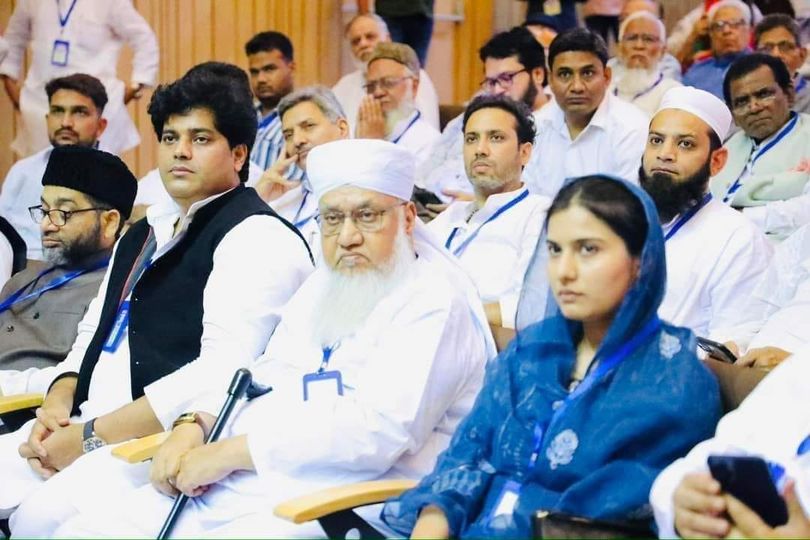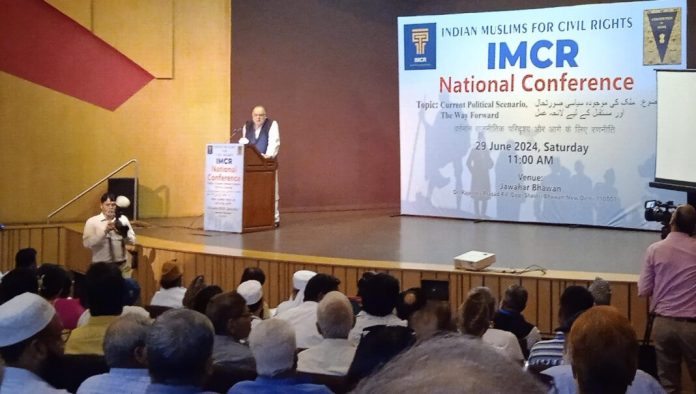New Delhi, July 2: Former ministers, parliamentarians, socio-religious leaders, newly elected MPs gathered under the banner of IMCR here Saturday to deliberate on the mandate of Lok Sabha polls, present political scenario and evolve roadmap for the upcoming assembly elections.
Most of the speakers emphasised to strengthen social bonding cutting across faith, caste and class for political transformation through dialogue and people-to-people contact to overcome hate and divisive agenda.
Mohd Adeeb, former parliamentarian and Chairman of Indian Muslims for Civil Rights (IMCR), in his opening remarks, said, “I have never seen and imagined in my political career what has happened in the last 10 years; all democratic, constitutional institutions have been hijacked. We Muslim community once lived in India as brothers but now as enemies. Our Prime Minister calls us infiltrators, our houses were bulldozed, children were killed, lynched and jailed. But our secular parties remained mute spectator.”
He added, “Muslims this time displayed the highest level of political maturity. Today Alliance has got strength, power and energy. They remained silent on issues of Muslims when they had no power but why are they silent now after gaining numbers and strength? Today they are afraid to say ‘Muslims’ and using the term ‘minorities’. Whatever we have suffered is because of the silence of the secular forces and it is high time they should raise their voice to respect and reciprocate the mandate. All those who are fighting for the Constitution should remember that safety of Muslims is also enshrined in that Constitution.”
Syed Sadatullah Husaini, President of Jamaat-e-Islami Hind, stated, “This election has clearly rejected hate and communalism. All those constituencies where communal and hate speeches were made, people have rejected politics of communalism and this is a very powerful message. We all should try to strengthen relationship with our non-Muslim brothers; it would eventually discourage and put an end to these fascist forces. It is therefore essential that political leaders, civil society groups, IMCR, Jamaat-e-Islami should be ready for a long struggle because the poison of communalism is still there.”
The JIH president also emphasised that the secular forces won elections where they were clear in their approach with confidence but lost many seats where they followed soft Hindutva and were confused. We should remind the mandate of the people to these secular forces. The country has high expectations from all first timer MPs who are qualified and have political wisdom.
 Maulana Sajjad Nomani, spokesperson of All India Muslim Personal Law Board, in his presidential address said, people by and large voted on issues and the communal fascist forces failed to polarise the elections. The present political scenario gives hope for the future. If we all work together, fight for justice of the oppressed and other weaker sections, results could be more encouraging.
Maulana Sajjad Nomani, spokesperson of All India Muslim Personal Law Board, in his presidential address said, people by and large voted on issues and the communal fascist forces failed to polarise the elections. The present political scenario gives hope for the future. If we all work together, fight for justice of the oppressed and other weaker sections, results could be more encouraging.
While rejecting hate and communalism has penetrated deep, he called on all like-minded political leaders and people to work together to fill the vacuum which has been created among communities through hate, mischief, propaganda and divisive politics through strengthening social relationship.
Former Union Minister and IMCR Founder Trustee Salman Khursheed reminded that INDIA bloc partners should introspect where the performance was not satisfactory. He recalled what will be the meaning of our celebrations after the verdict if the judgement of AMU minority character goes the other way. It is said that the way the government treats AMU will reflect how India treats its minorities.
RJD leader and Rajya Sabha MP Manoj Jha expressed concern about the change in the political vocabulary where political leaders refrain from using the term ‘Muslims’ instead they are using ‘minorities’. I have been saying for the last 10 years that electoral victory is no guarantee to ideological victory. If we have not won ideologically, we have lost despite good performance
Sanjay Singh of AAP said just using the term secularism may not suffice unless we are ready to live secularism. I am not afraid of jails, will continue to fight for people’s rights, secularism, democracy and Constitution.
Iqra Hasan, MP from Rampur said social transformation is more important than political transformation and it’s important to take along all communities irrespective of their faith, caste and class together if we really think of a better India where rights of all communities are protected.
Rajya Sabha MP Imran Pratapgarhi talked about creating a pressure group of political leaders, and civil society to intervene as and when required to safeguard the interest of oppressed and marginalised communities, including minorities.
Zia-ur Rahman Barq, MP from Sambhal, said if we come across anything wrong happening to any community, we have to raise our voice inside and outside the Parliament.
Kunwar Danish Ali, Ex-MP, said even if hewill not be able to raise people’s voice in Parliament, he will continue to fight on the streets to defend people’s rights.
According to ET Muhammad Basheer, former minister of Govt. of Kerala and General Secretary of IUML, the success of INDIA bloc was because of divine guidance apart from political strategy and other aspects.




